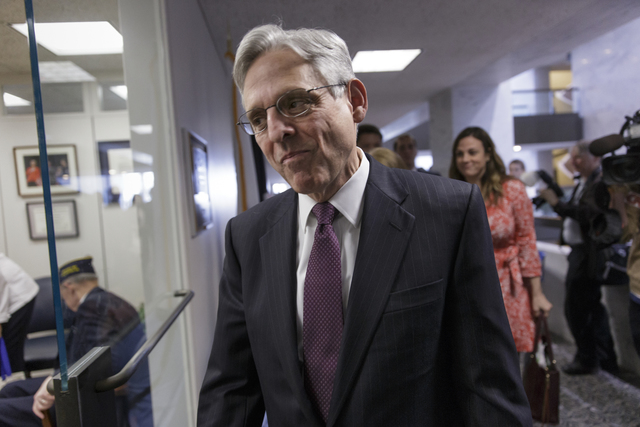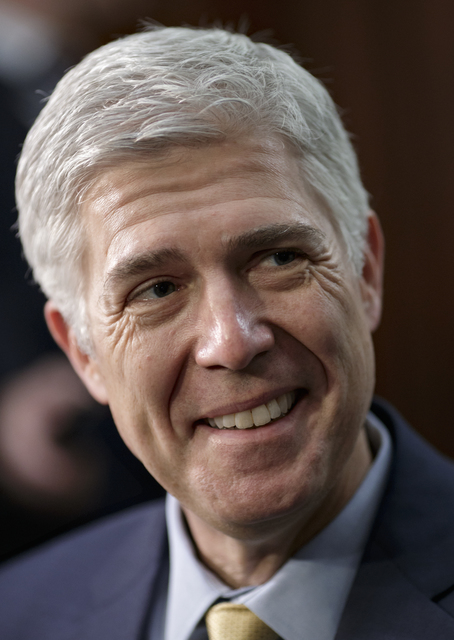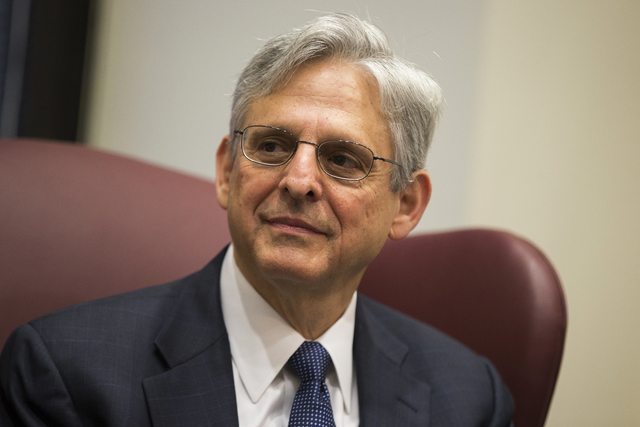Can Democrats ever forget treatment of Obama’s court nominee?



WASHINGTON — As Senate Democrats ponder whether to confirm Neil Gorsuch, President Donald Trump’s U.S. Supreme Court nominee, they cannot shake the specter of Merrick Garland, former President Barack Obama’s pick to fill the seat left empty when Justice Antonin Scalia died suddenly in February 2016.
When Trump nominated Gorsuch, Sen. Jeff Merkley, D-Ore., promptly promised to fight the nominee because Republicans had “stolen” the seat. Senate Majority Leader Mitch McConnell, R-Ky., decided there would be no vote on Obama’s nominee, and no hearings.
“To see him treated the way he was treated, walking the halls, having to beg for a meeting, asking for a hearing, receiving none,” Sen. Dianne Feinstein, D-Calif., recently told MSNBC. “For a year this went on, just about. It leaves a very deep rend.”
The refrain of Merkley and Feinstein resonates if you ignore the two elephants in the room: 2016 was a presidential election year, and with 54 senators, Republicans held a comfortable majority.
“It’s been standard practice to not move judges when you’re close to an election,” Georgetown University Law professor Randy Barnett observed.
The last time the Senate confirmed a Supreme Court justice in a presidential election year was February 1988. Current Justice Anthony Kennedy was President Ronald Reagan’s third choice for the seat freed up by the June 1987 retirement of Lewis Powell, picked by GOP President Richard Nixon. Reagan picked Kennedy after the Senate rejected his first choice, Robert Bork, and after second choice Douglas Ginsburg withdrew from consideration because he had smoked marijuana as a law professor.
GARLAND’S HURDLES
Northern Illinois University political science professor P.S. Ruckman Jr. studied the history of Supreme Court confirmations and found that Garland faced a number of critical hurdles. First, he was nominated during a contentious presidential election. Second, Garland would have replaced a justice of the opposite party. Third, the court was closely balanced, with five justices appointed by a Republican and four by a Democrat before Scalia’s death.
The odds of getting Garland confirmed, said Ruckman, “were just about zero.”
If the Senate had held hearings for Garland, they “could only have served to injure him, not benefit him,” Barnett said. “Look at the hearings for Trump nominees. You could say McConnell did Garland a favor.”
“This is the first time in American history that one party blockaded a nominee for almost a year in order to deliver a seat to a president of their own party,” Merkley charged.
But if the tables were turned, if a Republican president nominated a conservative judge to replace a Democratic justice and that confirmation would shift the balance of power during an election year, does anyone believe a Democratic Senate would do anything that would help make that confirmation succeed?
Former Vice President Joe Biden is in no position to so argue. In 1992, the then-chairman of the Senate Judiciary Committee argued that the Senate should consider a different standard for Supreme Court nominees presented “in the full throes of an election year.”
PAST PRACTICE
“It is my view that if a Supreme Court Justice resigns tomorrow or within the next several weeks or resigns at the end of the summer,” said Biden, “President Bush should consider following the practice of a majority of his predecessors and not — and not — name a nominee until after the November election is completed.”
Harvard law professor Alan Dershowitz argued in the Boston Globe that “the Senate has a constitutional obligation either to consent or deny consent to a president’s nominee.”
In Garland’s case, Barnett said, “the Senate refused its consent to the appointment of any Supreme Court justice until the people had a chance to decide who would be the next president.”
Both Gorsuch and Garland are accomplished jurists, widely respected in legal circles and with mainstream appeal. If Democrats maintain that Republicans had an obligation to consider the mainstream Garland, they should consider Gorsuch, because as everyone knows, elections have consequences.
Can either party let go of 2016? Before Feinstein met with Gorsuch, she told MSNBC it is important “that we get over what happened last year. This is hard to do because it went on and on for months. The humiliation it caused a very good man resounds with all of us still.”
But she added that she believes Democrats should and will give Trump’s nominee serious consideration, adding, “I think we should go on.”
Contact Debra J. Saunders at dsaunders@reviewjournal.com or at 202-662-7391. Follow @DebraJSaunders on Twitter.












